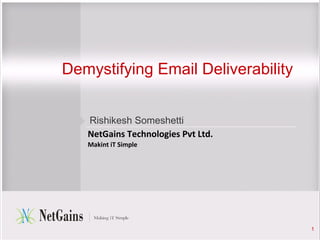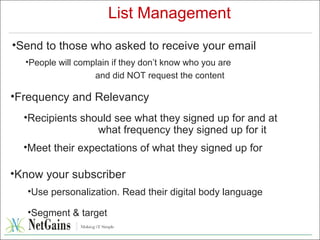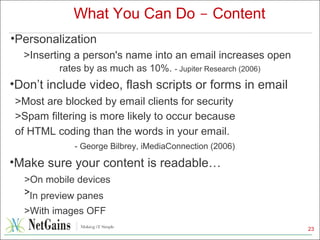Demystifying email deliverability
- 1. Demystifying Email Deliverability Rishikesh Someshetti NetGains Technologies Pvt Ltd. Makint iT Simple 1
- 3. Agenda What is a Sender Score or Reputation? What are the factors in that Score? How to improve them? Deliverability 101 Complaints, Bounces, Spam Trap, Volumes, List Management, and Content What does it cost me? 3
- 4. What is a Sender Score? •Sender Score is a credit score. “Reputation” •Just like when the dealership your getting a car loan from •checks your financial score •Reputation comes down to what other people think of your email methods. •What is email based on? •Complaints •Bounce Rate • Hard • Block • Backlistings •Volumes •Spamtraps 4
- 6. Why is it Important? •In 2009, an estimated 95% of all email was classified as SPAM Because of increasingly aggressive filtering technologies • Forgeries, Content Hijackings, growing botnets, etc •On average, 27.6% of commercial emails sent to business addresses don't reach the inbox. - Return Path (2009) •In North America, only 80% of legitimate email is delivered to the Inbox - Return Path’s Biannual report on message deliverability •90% of delivery issues are related to senders behaviors and NOT content - George Bilbrey, Return Path 6
- 7. Email Deliverability 101 •Complaints •Bounces •Spam Trap •Volumes •List Management •Content 7
- 8. Complaints •#1 most important factor in reputation •Human response to unwanted mail •Receivers notices back to senders •Feedback Loops •Very low threshold •0.01% of all email sent in 24 hour period
- 10. What You Can Do - Monitor Complaint Rates •SPAM Unsubscribe Report •Remember keep under 0.01% •Trend over time •Review ALL changes when things go wrong
- 11. Email Deliverability 101 •Complaints •Bounces •Spam Trap •Volumes •List Management •Content 11
- 12. All About Bounces •High bounces signal bad lists or list management practices •Indicative of spammers •Send to as many addresses as possible No regard for valid of addresses •Don’t stay around for reporting •Very hard for receiver to differentiate between bad list management and actual spamming
- 13. Dealing with Bounces •Hard Bounce •Bad email addresses •Soft Bounces •Mailbox full •Blocks/Spam •Content •URL •Technical Failures •Server down •Out of Offices 13
- 14. What You Can Do - Spam Traps •Remove them? How? •Don’t buy *random* lists •Ask for data history if you buy list •Get SLA’s •Watch e-pending services •Remove inactive accounts •Quality over Quantity •Run re-Confirmation processes •Use confirmed opt-in in at capture 14
- 15. Email Deliverability 101 •Complaints •Bounces •Spam Trap •Volumes •List Management •Content 15
- 16. Volumes •Volume is not in itself good or bad, but is an important part of the overall reputation algorithm. •A higher score equates to larger volume monitored by the Sender Score Reputation Network. = More to measure you on 16
- 17. What You Can Do - Volumes •Do not send too frequently or randomly •Send a steady, consistent volume •Send from clean shared range if low volumes •Create multiple interests •Newsletter •Marketing 17
- 18. Email Deliverability 101 •Complaints •Bounces •Spam Trap •Volumes •List Management •Content 18
- 19. List Management •Send to those who asked to receive your email •People will complain if they don’t know who you are and did NOT request the content •Frequency and Relevancy •Recipients should see what they signed up for and at what frequency they signed up for it •Meet their expectations of what they signed up for •Know your subscriber •Use personalization. Read their digital body language •Segment & target
- 20. What You Can Do - List Management •Ensure you don’t look like a spammer when delivering to non-existent accounts •Spammers batch and blast to the same list every time •Old accounts are sometimes re-used as spamtraps 18-24 months later Remove bad email addresses •Reduce the amount of complaints against your IP •Watch your spam unsubscribe reports regularly for trends •Remove contacts that don’t click-through •Ensures spam trap hits are low •Don’t buy lists or buy from trusted sources •Perform opt-in •Send email confirmations •Activity filters •Remove inactive contacts from your database
- 21. Email Deliverability 101 •Complaints •Bounces •Spam Trap •Volumes •List Management •Content 21
- 22. Content •Content is still important, but not as much as in the past when it comes to “sounding” like a spammer •Content preview testing •Relevancy •Call to action •Image to text ratio
- 23. What You Can Do - Content •Personalization >Inserting a person's name into an email increases open rates by as much as 10%. - Jupiter Research (2006) •Don’t include video, flash scripts or forms in email >Most are blocked by email clients for security >Spam filtering is more likely to occur because of HTML coding than the words in your email. - George Bilbrey, iMediaConnection (2006) •Make sure your content is readable… >On mobile devices >In preview panes >With images OFF 23
- 25. Why Do You Care?
- 26. W
- 27. Digital Body Language™ •Drives cleaner leads to website •Who opened? •Who clicked? Where? •Who’s active? Who’s not? •What’s most important to them? •Segmentation and relevancy •Nurture •Integration •Deliverability PLUS+ 27
- 28. What else does NetGains do to help? •Provide dedicated or shared IP’s/Branding •Dedicated Delivery and Privacy Team •24x7 Monitoring •Automatically suppress / report hard bouncebacks •Bounceback History Report •Automatically suppress / report ISP based complaints •SPAM Unsubscribe List report •Suppress known bad spelling, known SPAM traps, high •level complainers, FCC Wireless Suppression list •Deliverability Testing through Return Path •Email and Privacy Certification
- 29. What you can do •Monitor IP reputation •http://www.senderscore.org • Create a FREE account • Have you IP or Domain ready •Monitor complaint rates and adjust •Trend in your email applications •Remove them •Monitor hard bounce rates and adjust •Are you being seen as spam or spammer? •Keep lists clean and relevant •Remove inactive •Quality over Quantity
- 30. Getting to the Inbox
- 31. Contact Info NetGains Technologies Pvt. Ltd. 708 / 709, Corporate Avenue, Sonawala Road, Near Udyog Bhavan, Email: Sales@netgainstechnologies.com Goregaon (E). Mumbai-400 063. India. Website: http://www.netgainstechnologies.com
- 32. Q&A































